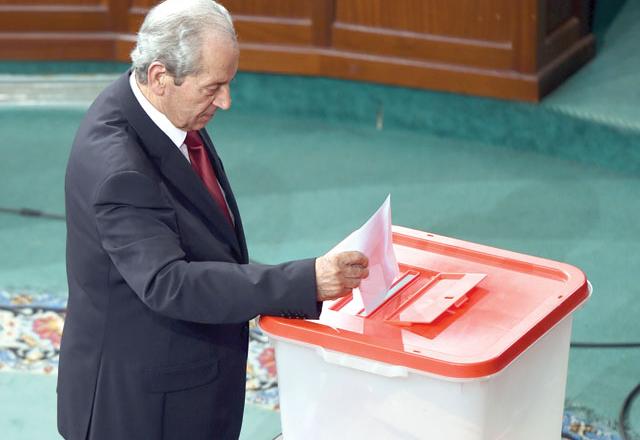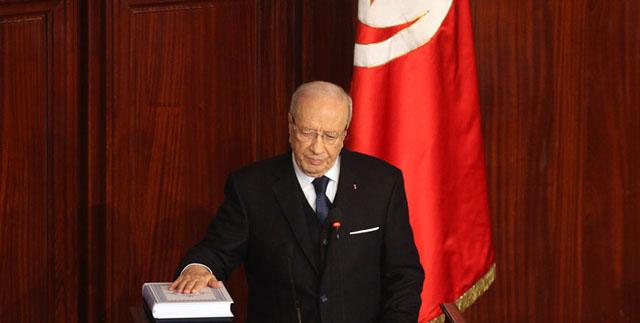You are here
Tunisia’s old regime hopes makeover can win it the election
By Reuters - Dec 20,2014 - Last updated at Dec 20,2014

TUNIS — In the corner of his office, Tunisian presidential candidate Beji Caid Essebsi keeps a bust of Habib Bourguiba, who led the country in 1957 after its independence from France. It is a symbol, he says, of the kind of statesman Tunisia now needs.
The 88-year-old was a minister in Bourguiba's government and is now standing for president himself. To win however he must convince voters to look past his more recent job — speaker for the autocratic Zine El Abidine Ben Ali, who rigged elections to rule for 24 years until the country threw him out in 2011.
That revolt inspired “Arab Spring” uprisings across the Middle East. Where other nations struggle with post-revolt upheaval, Tunisia’s presidential elections on Sunday highlight its successful shift to democracy and a new constitution.
But the race between Essebsi and incumbent President Moncef Marzouki, the human rights activist named president after the first free election of 2011, is also dominated by questions over the return of those close to Ben Ali, who fled to Saudi Arabia.
Some former regime officials have already secured parliamentary positions after Essebsi’s secular party Nidaa Tounes took the most seats in an October general election.
Following that, Essebsi secured 39 percent in the first presidential round in November against 33 per cent for Marzouki.
The presidential candidate, who was once Ben Ali’s parliamentary speaker, distances himself from the corruption and abuses associated with the past regime. Instead he offers his experience as a statesman that he says Tunisia needs after three years of instability.
“Do people really think at my age I will take over everything? I will be the president for all Tunisians,” Essebsi said during a campaign stop earlier this month. “All I want is to return the prestige of the state.”
Compromise
Incorporating Ben Ali officials into politics was part of the political compromise that salvaged Tunisia’s transition and set it apart from other countries, like Libya and Egypt, that still struggle after the Arab Spring to deal with past regime influence.
Ben Ali officials were not hunted down and a law to ban members of his party from politics never made it past initial proposals.
Now Essebsi, who regularly deflects criticism about his age with quips, refers to Bourguiba in his appeal to Tunisians now hoping for more stability.
The first president of Tunisia, Bourguiba ruled for twenty years before being removed by Ben Ali and kept under house arrest until his death. Though he consolidated Tunisia’s one-party system, many Tunisians still see him as the founder of a secular-leaning state with its emphasis on education, women’s rights and economic development.
Marzouki only talks of Essebsi in the context of the Ben Ali era. But he says a win for his opponent would undermine the legacy of the “Jasmine Revolution” and risk consolidating power in the hands of former regime men, known as the “Remnants”.
“Essebsi is not a democrat. He doesn’t know what democracy is,” Marzouki said in a recent speech.
Limited authority
Yet should Essebsi win, victory would be tempered by the political and economic challenges facing Tunisia: A low-intensity Islamist militant insurgency and a need for tough austerity measures to ease the budget deficit.
His party’s slim margin in Congress also means it will be forced to compromise when lawmakers choose a prime minister and form a new government. It is unclear whether Nidaa Tounes would be able to work with the leftist Popular Front or the Islamists Ennahda in a national coalition — both strong movements.
Ennahda remains a powerful political voice with 69 seats versus Nidaa Tounes’ 85 seats in the 217-member legislature.
“As a result, the next government will be largely ineffective and unable to implement any major economic reform,” said Eurasia Group analyst Riccardo Fabiani, referring to the challenges of forming a coalition government.
Many participants in the 2011 uprising say they too will be warily watching the return of old regime.
This week marked the fourth anniversary of the death of Mohamed Bouazizi, the street vendor who set himself alight in protest and triggered the uprising against the abuses and poor living conditions many suffered under Ben Ali.
“We paid a high price for the revolution and now just four years later the old regime is back with a new look and democratic talk,” said Ali Makki, whose brother was shot dead in protests.
“We’ll keep fighting for freedoms we won.”
Related Articles
Tunisians vote on Sunday in a presidential election pitting an ex-official from the days of autocrat Zine El Abidine Ben Ali against a rights activist appealing to the spirit of the 2011 revolt that ousted him.
Tunisia’s first parliament since the 2011 revolution on Thursday elected veteran politician Mohamed Ennaceur, 80, of anti-Islamist party Nidaa Tounes as house speaker.
Anti-Islamist Beji Caid Essebsi, 88, was sworn in Wednesday as Tunisia's first freely elected president vowing to work for national reconciliation, four years after an uprising that sparked the Arab Spring.













